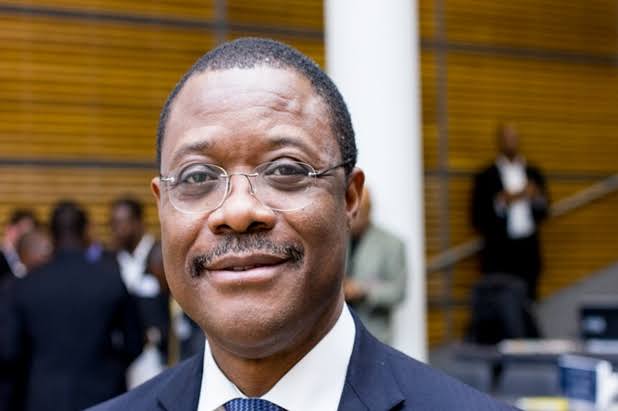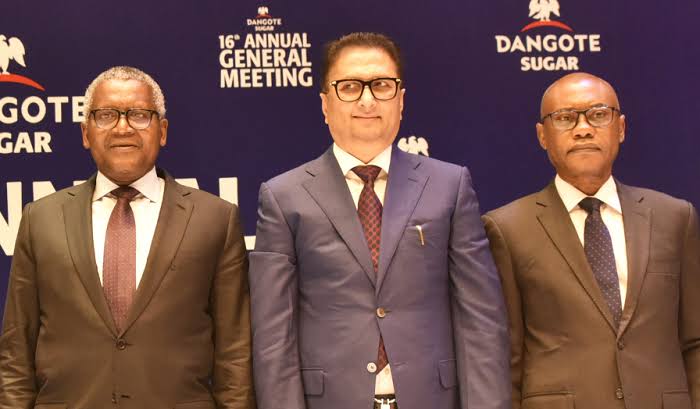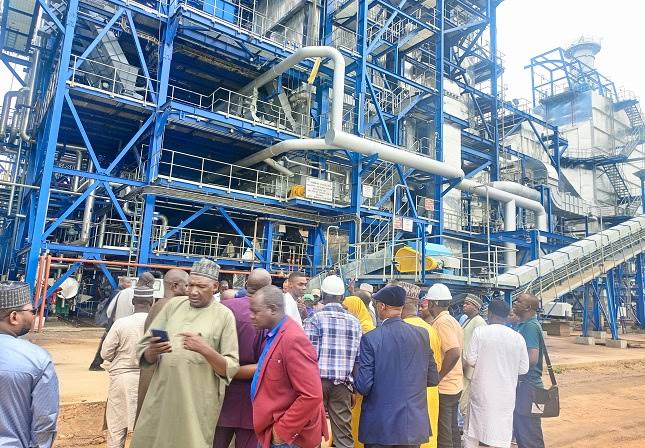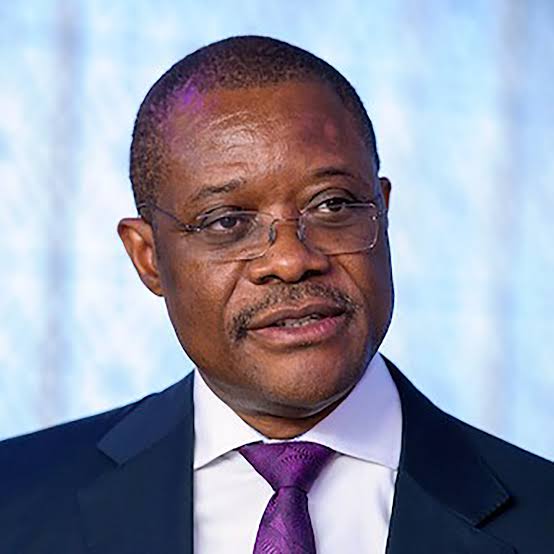In the hushed elegance of Lagos Island’s business district, whispers turned into headlines. On June 13, 2025, Aliko Dangote, Africa’s wealthiest man and Nigeria’s most iconic industrialist, stepped down as Chairman of Dangote Sugar Refinery Plc, the company he had transformed from a humble sugar packaging operation into a West African agricultural force.
There were no fanfares. No farewell speeches. Just a regulatory filing with the Nigerian Exchange, confirming that the billionaire who had personified the Dangote brand would no longer chair its sugar subsidiary.
In his place? A name unfamiliar to many outside Africa’s boardrooms: Arnold Onyekwere Ekpe.
While the Dangote Group remains tightly under the control of the founding family—with Aliko himself still at the helm of the conglomerate—this transition marks a symbolic handover.
The departure raises one big question: Who is Arnold Ekpe, and what does his appointment mean for the future of Dangote Sugar and Nigerian industrial capitalism?
Unpacking the Man: Who Really Is Arnold Ekpe?

Arnold Ekpe doesn’t court attention. But his resume reads like a blueprint for cross-continental influence.
Born in 1953, Ekpe attended King’s College, Lagos, Nigeria’s elite high school, before heading to the UK for university. He earned a First-Class degree in Mechanical Engineering from the University of Manchester and an MBA from Manchester Business School, both in the late 1970s.
But it was in banking—not engineering—where Ekpe found his true arena.
Ecobank and the Making of a Pan-African Banker

Between 1996 and 2001, and again from 2005 to 2012, Ekpe served as Group CEO of Ecobank Transnational Incorporated, transforming it into Africa’s largest Pan-African banking group. When he rejoined in 2005, the bank had operations in just a handful of countries.
By the time he stepped down in 2012, Ecobank had a presence in more than 33 African nations, employing over 18,000 people and overseeing billions of dollars in assets.
Between his two Ecobank tenures, he briefly served as CEO of United Bank for Africa (UBA), another continental player. He’s also been a partner at African Capital Alliance, and held board roles in Atlas Mara, Crown Agents Bank, Afreximbank, NSIA, and Baobab Group.
Recognition and Low-Profile Influence
Despite his boardroom pedigree, Ekpe has largely avoided the limelight. That hasn’t stopped him from accumulating accolades:
- African Banker Lifetime Achievement Award (2011)
- African Business Leader of the Year (2008)
- Distinguished Alumni Award, University of Manchester (2019)
These honors, while noteworthy, do little justice to his actual influence: he’s been instrumental in quietly shaping capital flows across African borders, advising governments, regulators, and multinationals behind the scenes.
Why Dangote Picked Ekpe — and What It Signals

When a founder steps back, it isn’t just about age or corporate governance—it’s about legacy preservation and strategic continuity. Ekpe’s appointment ticks several critical boxes:
1. Governance Strength
In recent years, investor pressure has grown around separating ownership from oversight, especially in family-owned giants. With Dangote still serving as Group President and major shareholder, appointing an independent, non-family chairman provides crucial optics—and substance—for international investors.
Ekpe brings a reputation for boardroom integrity, compliance rigour, and capital discipline.
2. Pan-African Expansion Expertise
Dangote Sugar is not just looking inward. Its major 12,000-ton-per-day sugar plant in Kwame-Danso, Ghana, is part of a broader push to reduce West Africa’s dependency on sugar imports, a market worth over $1.5 billion annually. Ekpe’s Ghanaian corporate ties, Ecobank roots, and familiarity with regulatory landscapes across ECOWAS make him an asset for transnational scaling.
3. Sector-Crossing Experience
While sugar isn’t banking, the corporate challenges are similar: dealing with large workforces, multi-country operations, regulation, foreign exchange volatility, and long-term infrastructure financing. Ekpe has done all of that—and thrived.
What Ekpe Is Walking Into: The State of Dangote Sugar

Performance Snapshot
- In Q1 2025, Dangote Sugar reported:
- ₦213.9 billion in revenue (+74.3% YoY)
- A significant narrowing of its net loss
- Improved domestic sourcing from integrated sugar farms in Adamawa, Nasarawa, and Taraba
- The company’s 2024 full-year turnover was ₦665.6 billion, a 51% jump from 2023—driven by volume growth and price adjustments.
Backward Integration Challenge
The National Sugar Master Plan requires sugar producers to shift away from imports and grow their own cane.
While Dangote has made progress, land acquisition disputes, local resistance, and bureaucratic bottlenecks still hinder farm operations. Ekpe will need to navigate this maze.
The Ghana Bet

The upcoming Ghana plant is a major test. If executed right, it will:
- Create 7,000 jobs directly
- Cut Ghana’s $162 million sugar import bill
- Serve as a launchpad into Francophone West Africa
Failure, however, would be a high-profile embarrassment.
The Ekpe Playbook: What to Expect

If history is any guide, Arnold Ekpe will take a low-key but high-impact approach, focusing on:
Corporate Governance
Expect clearer financial disclosures, improved ESG compliance, and board reshuffling to align with international investor expectations.
Growth With Caution
Ekpe is not known for reckless expansion. The Ghana project will proceed cautiously, with phased implementation tied to local engagement and funding rounds.
Agro-Industrial Scale-Up
Ekpe’s interest in vertical integration means Dangote Sugar could diversify further into:
- Ethanol production
- Animal feed
- Power generation from bagasse
This would mirror Brazil’s sugar-energy model and position Dangote Sugar as a multi-product agro-industrial firm.
The Legacy of Dangote: Founder vs. Institution
Aliko Dangote remains the symbolic and economic powerhouse of the Group. His decision to step down as Chairman of Dangote Sugar is not a retreat—it’s a realignment.
Insiders say he’s focusing on the $19 billion Dangote Refinery, Nigeria’s largest-ever private industrial project. With oil and petrochemicals as his next frontier, leaving the sugar boardroom to Ekpe signals an important phase in the founder’s decentralization strategy.
Yet this raises a bigger question: Can Dangote Group become truly institutional, or will it always be tethered to one man’s will?
The Bigger Picture: Nigeria’s New Boardroom Class
Ekpe’s appointment fits a trend of high-capital Nigerian companies turning to technocrats and international operators rather than political allies or family members:
Transcorp Group appointed Owen Omogiafo, a performance-driven technocrat, as CEO.
Seplat Energy has built a board with foreign-trained professionals and local governance hawks.
Even political juggernauts like Tony Elumelu and Abdul Samad Rabiu are aligning their boards with global governance codes.
It’s the emergence of a new corporate Nigeria, where boardroom chairs are earned—not inherited—and impact matters more than influence.
What Could Go Wrong?
Ekpe’s resume is unimpeachable, but challenges remain:
1. Age: At 72, he may not represent a long-term transition. Succession within the board itself will need planning.
2. Operational Blindspots: He’s not from an agro-processing background. That may slow learning curves.
3. Legacy Entanglement: Even as chairman, will Ekpe be truly independent, or will Aliko still pull strings informally?
4. Political Distractions: With Nigeria’s economic uncertainty, even the best boards face curveballs beyond their control—fuel policy shifts, currency reform, power tariffs, import bans.
Final Word: The Chairman Nigeria Didn’t See Coming
Arnold Ekpe’s appointment may not generate the noise of a political reshuffle or a celebrity CEO drop, but in Nigeria’s boardrooms, this is a tectonic shift. It’s a sign that Aliko Dangote, long seen as a lone-wolf industrialist, understands the value of institutionalization.
Ekpe is more than a placeholder. He’s a signal to the world that Africa’s biggest companies are growing up—and growing smart.
Whether the Dangote Group becomes more like Unilever and less like a one-man empire depends on what happens next. But one thing is clear:
As Dangote steps back, Nigeria should pay attention to the man stepping in.













Leave a comment